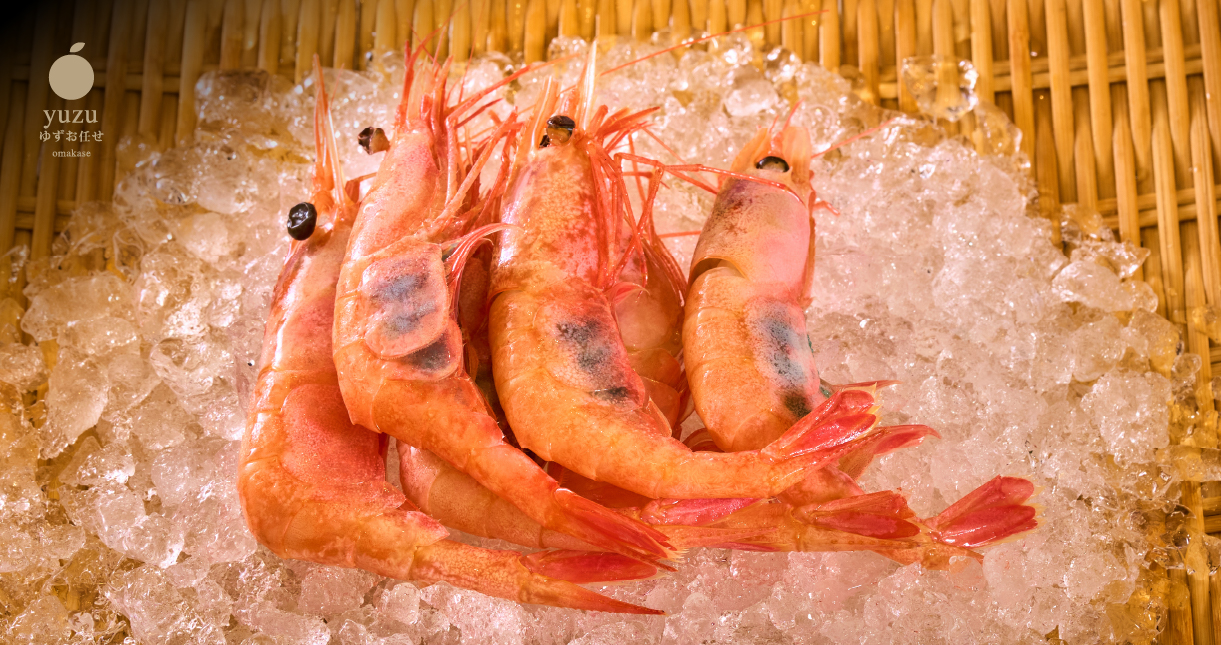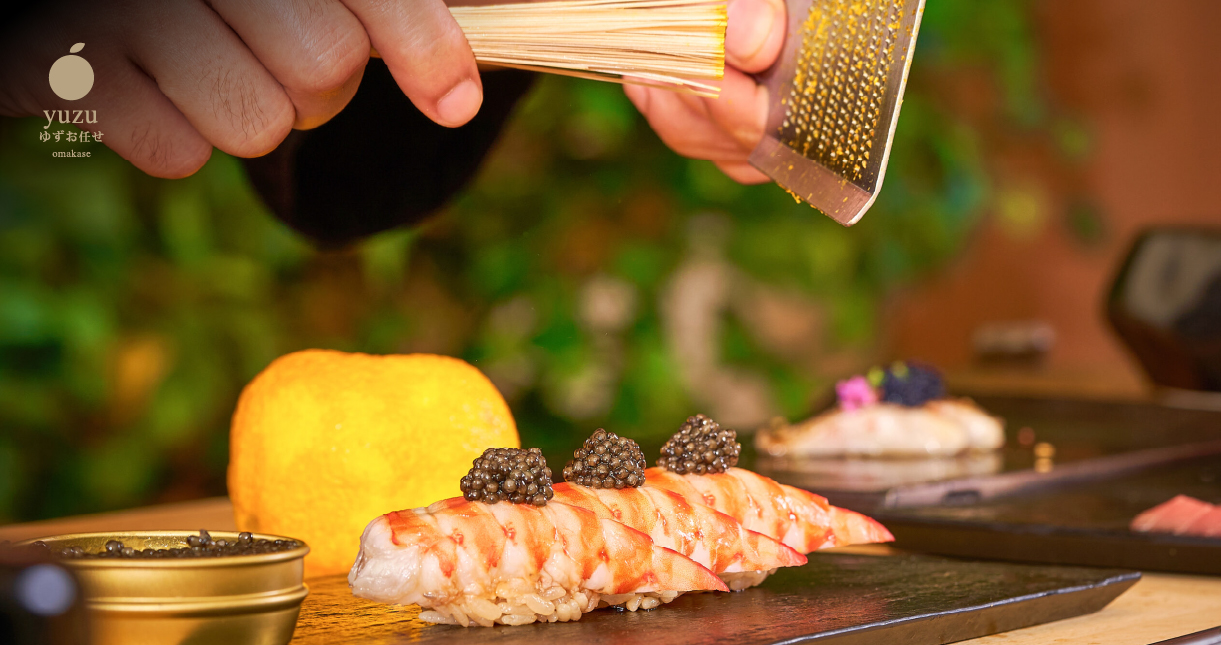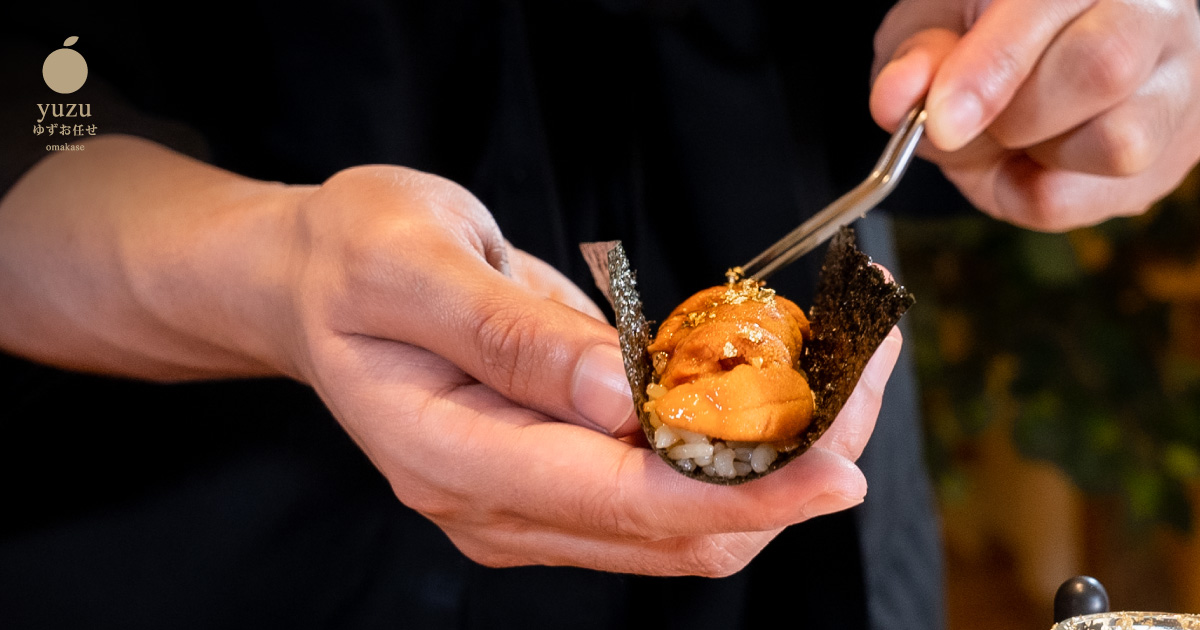
Nutritional Value of Common Omakase Ingredients
Omakase, a traditional Japanese dining experience, is not only a feast for the senses but also a rich source of essential nutrients that contribute to overall well-being. At Yuzu Omakase in Bangkok’s Siam Square, each dish is carefully crafted using high-quality ingredients that are both delicious and packed with nutritional benefits. This article takes a detailed look at the nutritional value of some of the most common ingredients used in omakase, highlighting how these components contribute to a balanced and healthful diet.
Well-Being ● 2024 Aug 27
Nutritional Value of Common Omakase Ingredients


1. Maguro (Tuna)
Nutritional Benefits
⦁ High in Protein
Tuna is an excellent source of high-quality protein, essential for muscle repair and growth.
⦁ Rich in Omega-3 Fatty Acids
These essential fats support heart health by reducing inflammation and lowering blood pressure.
⦁ Vitamins and Minerals
Tuna is a good source of vitamins B12 and D, as well as selenium, which plays a key role in maintaining a healthy immune system.
Health Impact
Maguro, particularly when served as Akami (lean tuna) or Otoro (fatty tuna), offers a balanced mix of nutrients that support cardiovascular health, muscle maintenance, and overall vitality. The high protein content helps keep you satiated, while omega-3 fatty acids contribute to brain health and reduced inflammation.
2. Salmon (Sake)
Nutritional Benefits
⦁ Excellent Source of Omega-3 Fatty Acids
Like tuna, salmon is rich in omega-3s, which are crucial for reducing inflammation and supporting heart health.
⦁ Rich in B Vitamins
Salmon is packed with B vitamins, including B12, B6, and niacin, which are important for energy production and maintaining a healthy nervous system.
⦁ High in Antioxidants
The presence of astaxanthin, a powerful antioxidant, helps protect cells from damage and supports skin health.
Health Impact
Salmon, particularly when served as sashimi or nigiri, is a nutrient-dense choice that promotes heart and brain health. Its high content of healthy fats and vitamins makes it an ideal ingredient for maintaining energy levels and reducing the risk of chronic diseases.
3. Uni (Sea Urchin)
Nutritional Benefits
⦁ Rich in Protein
Uni is a good source of protein, providing essential amino acids needed for tissue repair and muscle growth.
⦁ High in Omega-3 Fatty Acids
Uni also contains healthy fats that support cardiovascular health.
⦁ Vitamins and Minerals
Uni is rich in vitamins A and E, which are important for skin health and immune function, as well as zinc, which supports metabolism and immune defense.
Health Impact
Uni is often considered a luxurious delicacy, but it’s also a powerhouse of nutrients. The combination of omega-3 fatty acids, vitamins, and minerals makes uni an excellent choice for those looking to support heart health, boost immunity, and maintain youthful skin.
4. Ebi (Shrimp)
Nutritional Benefits
⦁ Low in Calories
Shrimp is low in calories yet high in protein, making it an excellent choice for those managing their weight
⦁ Rich in Iodine
Iodine is essential for thyroid function, and shrimp is one of the best dietary sources of this mineral.
⦁ Contains Antioxidants
Shrimp contains the antioxidant astaxanthin, which helps protect against oxidative stress and supports heart health.
Health Impact
Ebi, or shrimp, is a lean source of protein that supports weight management and metabolic health. Its high iodine content is particularly beneficial for thyroid health, while its antioxidants help combat inflammation and protect against heart disease.
5. Nori (Seaweed)
Nutritional Benefits
⦁ High in Vitamins and Minerals
Nori is rich in vitamins A, C, and B12, as well as iodine, which is essential for thyroid health.
⦁ Good Source of Fiber
The fiber in nori supports digestive health and helps maintain healthy blood sugar levels.
⦁ Rich in Antioxidants
Nori contains antioxidants that help protect the body from damage caused by free radicals.
Health Impact
Nori, commonly used as a wrap for sushi rolls, is a nutrient-dense seaweed that supports thyroid function, immune health, and digestion. Its high antioxidant content also makes it a protective food that contributes to overall well-being.
6. Tamago (Japanese Omelette)
Nutritional Benefits
⦁ High in Protein
Eggs are a complete protein, meaning they contain all nine essential amino acids necessary for the body.
⦁ Rich in Vitamins
Tamago is a good source of vitamins D and B12, which are important for bone health and energy production.
⦁ Contains Choline
Choline is vital for brain health and plays a role in memory and mood regulation.
Health Impact
Tamago offers a balanced source of protein and essential nutrients that support muscle maintenance, brain health, and energy levels. The combination of protein and healthy fats makes tamago a satiating option that fits well into a balanced diet.
7. Saba (Mackerel)
Nutritional Benefits
⦁ Rich in Omega-3 Fatty Acids
Saba is one of the best sources of omega-3 fatty acids, which are crucial for heart and brain health.
⦁ High in Vitamin D
Vitamin D is important for bone health and immune function, and saba provides a significant amount of this nutrient.
⦁ Packed with Protein
Mackerel is a protein-rich fish that supports muscle growth and repair.
Health Impact
Saba, or mackerel, is a nutrient-dense fish that offers substantial benefits for cardiovascular health, bone strength, and immune support. Its high omega-3 content makes it an excellent choice for reducing inflammation and protecting against heart disease.
8. Ikura (Salmon Roe)
Nutritional Benefits
⦁ High in Omega-3 Fatty Acids
Ikura is rich in these essential fats, which support heart health and reduce inflammation.
⦁ Packed with Protein
Salmon roe is a protein-dense food, providing all the essential amino acids your body needs.
⦁ Rich in Vitamins and Minerals
Ikura contains vitamins A, D, and E, as well as selenium, which is important for immune function and thyroid health.
Health Impact
Ikura is not just a delicacy; it’s also a nutritional powerhouse. The combination of healthy fats, protein, and essential vitamins makes ikura a valuable addition to a health-conscious diet, supporting everything from heart health to immune function.
9. Yuzu (Citrus Fruit)
Nutritional Benefits
⦁ High in Vitamin C
Yuzu is an excellent source of vitamin C, which is essential for immune health and skin vitality.
⦁ Rich in Antioxidants
The antioxidants in yuzu help protect the body from oxidative stress and support overall wellness.
⦁ Low in Calories
Yuzu is a low-calorie fruit, making it a great flavor enhancer without adding extra calories.
Health Impact
Yuzu is often used in dressings and sauces to add a zesty, citrusy flavor to dishes. Its high vitamin C content supports immune health, while its antioxidants contribute to overall wellness. Yuzu’s refreshing flavor and health benefits make it a popular ingredient in omakase cuisine.
Conclusion

Omakase at Yuzu Omakase is more than just a dining experience; it’s an opportunity to enjoy a variety of nutrient-rich ingredients that support overall health and well-being. From the omega-3-packed Maguro and Saba to the antioxidant-rich Nori and Yuzu, each component of the omakase menu offers unique health benefits. Whether you’re looking to boost your heart health, support your immune system, or simply enjoy a balanced diet, the ingredients used in omakase provide a wealth of nutritional value. Plan your visit to Yuzu Omakase and savor a meal that’s as nourishing as it is delicious.

RELATE







